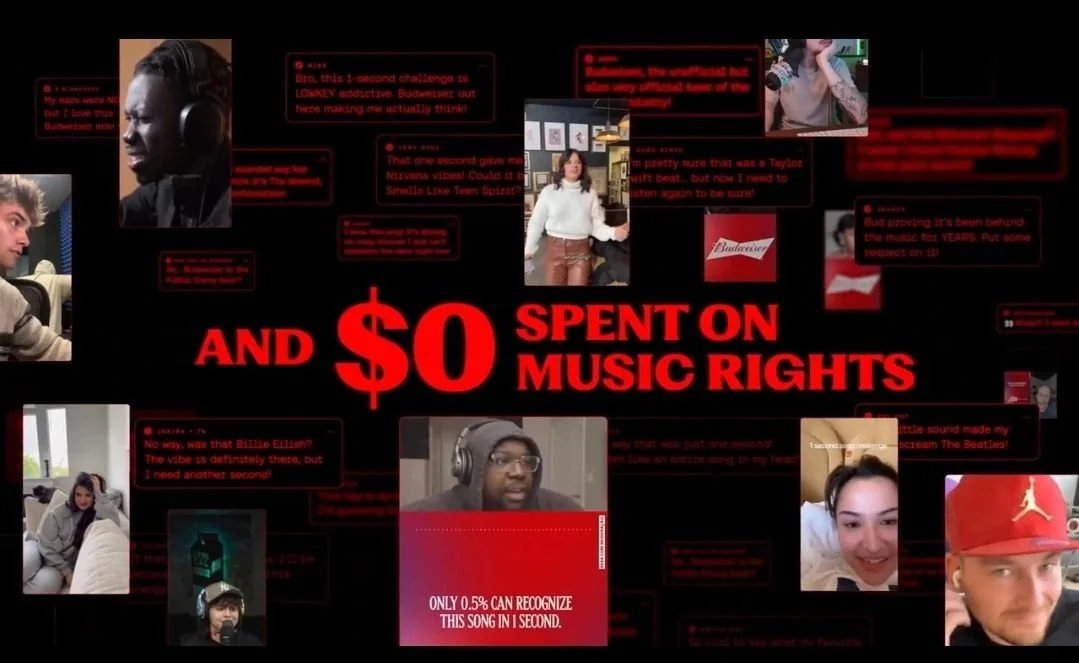At the Cannes Lions International Festival of Creativity - a global stage meant to celebrate creative excellence - a campaign was awarded the industry’s highest honour: a Grand Prix. Its hook? Using one-second snippets of popular songs to trigger recognition, while reportedly dodging music licensing fees.
That headline should make anyone in music and brand marketing sit up.
It did for me. And it clearly did for many others, thanks to Shez Mehra, who highlighted the campaign, and Dave Chase, whose sharp commentary gave this issue the platform it deserves. Their reflections have pushed an uncomfortable but crucial conversation into the mainstream - and it’s one we all need to reckon with.
Because this moment says something deeper about how the industry values culture, and by extension, the creators who build it.
One Second of Sound, a Lifetime of Impact
The campaign’s conceit was clever: one second is just long enough to trigger your brain’s emotional connection to a hit song - and just short enough to (allegedly) avoid paying for it. But while the execution may have been slick, the signal it sent was anything but.
Let’s be clear: this isn’t about tearing down the brand or the creatives behind the work. It’s about what we, as an industry, choose to celebrate - and the wider consequences of those choices.
Because if the creative benchmark becomes “how cleverly can you not pay artists?”, we’ve got a serious problem.
Culture Can’t Be Borrowed Without Permission
Music isn’t just a marketing tool. It’s a memory. A movement. A way for brands - especially those in lifestyle spaces like alcohol - to build lasting emotional connections.
But those connections must be earned. Not extracted.
Authentic music partnerships build credibility, loyalty, and resonance. Shortcuts, on the other hand, erode trust - both with creators and with audiences who see through it faster than ever.
In a world where every deck says “authenticity” and “equity”, celebrating a workaround that avoids paying musicians is more than a contradiction. It’s a warning sign.
What Can Brands Do Better?
If you work in brand or campaign strategy - especially in alcohol or FMCG, where music and lifestyle go hand in hand - here are some ways to raise the standard, not lower it:
1. Invest in the Relationship, Not Just the Track
Approach music as a long-term creative partner, not a one-off asset. Think campaigns that build with artists, not just feature them.
2. Don’t Mistake Cleverness for Creativity
Real creativity doesn’t avoid the value chain - it uplifts it. If a tactic feels like a loophole, it probably is.
3. Embed Music Early in the Brief
Don’t retrofit music as a post-production bolt-on. Co-create with artists and rights holders from day one.
4. Measure Cultural Impact, Not Just Efficiency
Ask whether your campaign is building brand legacy - or borrowing from someone else’s.
Advice for Artists Working With Brands
The best partnerships are reciprocal. Here’s how artists and teams can approach brand work with clarity and confidence:
1. Protect Your IP and Story
Even one second of your work has value. Make sure usage rights are clear and fair.
2. Get Involved Creatively
Push to be part of the process - not just the final cut. The more collaborative the partnership, the more authentic the result.
3. Align With Brands That Share Your Values
If a brand wants to licence your sound but not your story, think twice.
4. Know When to Say No
Not every opportunity is worth it. If it feels off, it probably is.
Final Word
This wasn’t just a Cannes case study. It was a test. And it revealed some uncomfortable truths about how we still treat creators in advertising.
So, to Shez Mehra and Dave Chase: thank you for raising the profile of this moment. For reminding the industry that if we truly care about creativity, culture, and equity - we need to prove it.
Let’s stop applauding the workaround and start rewarding the work. Music isn’t a hack. It’s heritage.
Creativity pays off. But only if we pay in.
